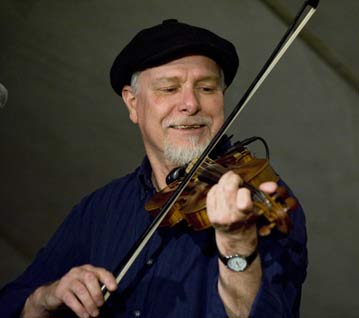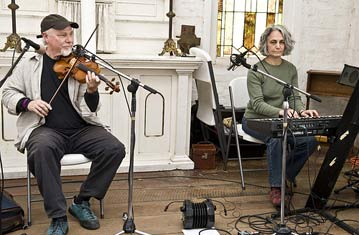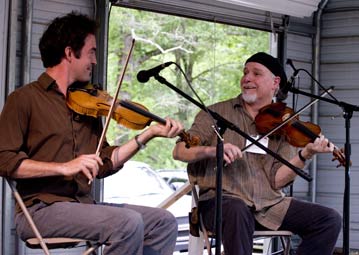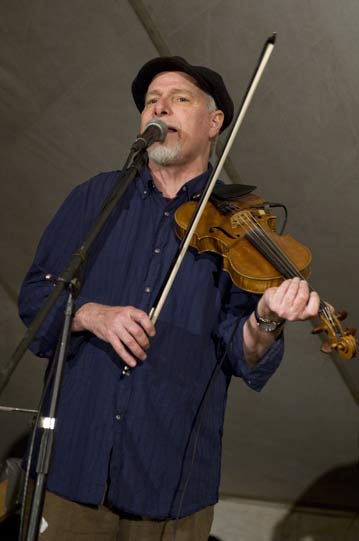|
Archive Files of Cajun, Creole, and Zydeco Musicians |
David Greely:Sud du Sud |
Click here for high resolution photos of David Greely |
|

David Greely is shown on stage during the 2009 Dewey Balfa Cajun and Creole Heritage Week, including a fiddle session with Joel Savoy. In the other photo, taken during the 2008 South Louisiana Black Pot Festival, he is shown with Linda Handelsman on keyboard.
|
David Greely concludes his liner notes to his 2009 CD, Sud du Sud, with an invitation to join him for a different side of Cajun music and culture: “Welcome to our kitchen. Put away your earplugs for a while.” For those of us who have spent years photographing bands in front of the stage right next to booming speakers, earplugs have become a necessity, but, as Greely demonstrates with 14 cuts on this CD, the musical nuances expressed by the unamplified fiddle have an emotional power that giant speakers cannot match. Before the accordion in Cajun and Creole culture there was the fiddle, played at family gatherings or with friends, producing music that captures a depth of feeling straight from the heart. As Greely explains, “Its rhythm is in its heartbeat and it doesn’t need to be pounded out through a public address system.” Greely includes several of his own compositions along with his interpretation of songs drawn from archives of Cajun and Creole music. The CD features several tunes from field recordings. Greely is accompanied by Linda Handelsman on piano as he plays “McGee’s A Minor Waltz” by Dennis McGee, recorded by Barry Ancelet in the 1970s,. “Cotillion/Chatagnier” is a Dennis McGee fiddle tune followed by Greely’s own composition named for Chataignier, the town where Dennis was born. Joel Savoy is on second fiddle. “Cajun Polka: Varise’s Polka, Chacoter, Sheahan’s Polka” is a twin-fiddle medley played with Roscoe Theriot and featuring tunes from Varise Conner and one written by Greely. The medley recalls a time when Cajun dancing encompassed more than waltzes and two-steps. “Old Cajun Waltz” is another Varise Conner tune. “Paul Junius Malveaux’s Tune” is a fiddle version of a tune from a Creole harmonica player, with rhythm supplied by Scott Kettner playing the pandeiro, a Brazilian hand drum. “Les filles de Vermilion” begins with a brief recording of the original a cappella ballad sung by Lula Landry, followed by the same melody played by a classical string quartet, with the musical arrangement supplied by David Greely’s son, Gustave, a Hollywood film composer. Fiddler Wade Fruge played “Galop” by himself. Greely’s version transforms the song into four-part harmony with a quartet of fiddlers. “J’ai marié un ouvrier” is based on a 1934 field recording made by John and Alan Lomax. On “Bayou Teche Waltz,” Creole fiddler Cedric Watson trades fiddle leads with David, who supplies the vocals. The CD begins with music familiar to Mamou Playboys fans at live performances (but never recorded by them), here turned into fiddle tunes. Joining Greely and trading lead fiddle parts with him is Gina Forsyth, accompanied by Sam Broussard on guitar, performing Pee Wee Broussard’s “Cankton 2-Step” and Sidney Brown’s “The Rolling Pin Special.” In addition to the new companion pieces to older songs from the archives mentioned above, original compositions on the CD include “Café Waltz,” inspired by Café des Amis in Breaux Bridge and featuring Gina Forsyth on lead fiddle, with Sam Broussard on guitar; “Kräfta” (the Swedish word for crawfish), which combines Greely’s “vicarious love for Nordic traditional music” with his “Cajun foundations”; and “Lune de Miel” (“Honeymoon Waltz”), a delicate, beautiful waltz, written for Linda Handelsman, who accompanies David on piano and to whom the CD is dedicated. The bilingual liner notes provide interesting background and insights into the music and the musicians. Click here to go to the first page on Steve Riley and the Mamou Playboys. |
Posted 5-21-09
All photographs and text by David Simpson.


